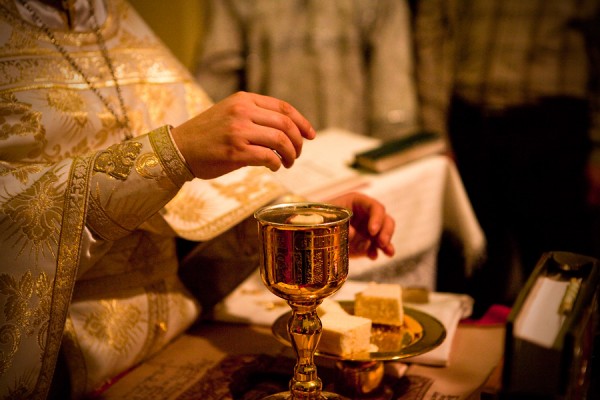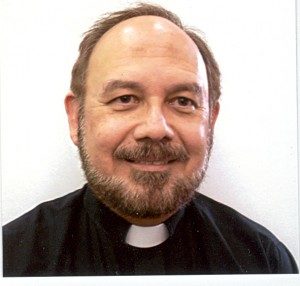
From 2012 – how did I miss this?
by Greg Garrison
Since the Rev. Ernesto Obregon switched denominations, he now can pinpoint the key differences in religious practices between Episcopalians and Greek Orthodox.
For one thing, the Greek Orthodox have a lot more incense. It’s dispensed in clouds of smoke at every service through a censer, a metal container on the end of a chain.
“Episcopalians do everything in moderation,” Obregon said. “Not too much incense.”
 Obregon, 60, left Cuba in 1961 and grew up in Ohio, eventually becoming an Episcopal priest. He and his wife, Denise, were missionaries to Bolivia and Peru from 1990-2000. From 2000 to 2004, Obregon was the coordinator of Hispanic ministry for the Episcopal Diocese of Alabama.
Obregon, 60, left Cuba in 1961 and grew up in Ohio, eventually becoming an Episcopal priest. He and his wife, Denise, were missionaries to Bolivia and Peru from 1990-2000. From 2000 to 2004, Obregon was the coordinator of Hispanic ministry for the Episcopal Diocese of Alabama.
He left the Episcopal priesthood in 2004 and began a transition to becoming an Orthodox priest, studying in an extension program for the Antiochan Orthodox Church.
Since January, Obregon has volunteered at the Greek Orthodox Cathedral of Holy Trinity-Holy Cross in Birmingham, assisting the Rev. Paul Costopoulos, who is the dean of the cathedral.
“He was anxious to serve,” Costopoulos said. “He’s a good priest; he’s a good teacher.”
Most weeks, Obregon assists in celebrating the Divine Liturgy. That often includes the ritual of incense.
“I swing a pretty mean censer,” Obregon said.
“The Orthodox do it every Sunday. I did have to learn how to do it really well. It’s swung in a different way. The Orthodox take a longer swing.”
Obregon said a turning point in his ministry came when the Episcopal Church in 2003 approved the consecration of its first openly gay bishop, Gene Robinson of New Hampshire.
“When they ordained the gay bishop in New Hampshire, that was a breaking point,” Obregon said. “I felt a doctrinal line had been crossed.”
That prompted him to leave the Episcopal Church, albeit with no complaints against the Episcopal Diocese of Alabama.
“It was nothing local,” Obregon said.
Bishop Henry N. Parsley, who retired as head of the Diocese of Alabama last year, understood and respected Obregon’s stance, he said.
“I had nothing but the greatest support for Bishop Parsley,” Obregon said. “He encouraged me.”
From a bilingual Episcopal priest who speaks both Spanish and English, Obregon has had to work more Greek into his vocabulary.
“I’m Greek Orthodox now,” he said. “I can even chant some in Greek.”
He was ordained as an Antiochan Orthodox deacon in 2006 and as a priest in 2007. He served at an Antiochan Orthodox Church in Florida for three years and returned to Birmingham in 2010 to work as a medical technologist at the Veterans Administration Medical Center. He has a bachelor’s degree in medical technology and two master’s degrees, in theology and philosophy.
Last year, he was named supervisor of the chemistry department at the VA Medical Center. That remains his full-time job, but he enjoys his role now as an Orthodox priest for the Greek Cathedral.
“Most Sundays I simply help them out,” he said. “On Memorial Day, I was the priest who went to bless the graves.”
Next week, he’ll be going to Huntsville to fill in for a month at the Greek Orthodox church there.
He’s had to make adjustments in theological perspective from Western Christianity to Eastern Orthodoxy, he said.
For example, the Eastern Orthodox place a strong emphasis on the importance of Jesus descending into Hades after his crucifixion, a point of theology that gets scant attention in the West.
“In both cases he died for our sins — Christ paid a penalty,” Obregon said. In Eastern Orthodoxy, “Christ tricked Satan when he went down to Hades,” an interpretation that has never been emphasized in the West.
The view of salvation has a different emphasis, he said.
“The East is oriented to a healing approach of salvation,” Obregon said. “You’re being healed. God is working with you to heal you and save you.”

Any stories about Calvary Chapel people and/or churches becoming Eastern Orthodox?
Many, but as of yet I have not been able to convince those former pastors to write their stories down for me.
It’s a pity that former CC pastors aren’t willing to share their stories. At St. Barnabas in Costa Mesa, California, we have someone that went to Moscow as a CC missionary. When I introduce him to people, I say that he went to Russia to tell people about God and discovered that He was already there.
Their approach to things makes it hard for them to see the importance of Church History and why we ought to pay attention to what people way back believed and what he did. When I mentioned the Eucharist to my oldest brother (he’s a Calvary Chapel person) his reaction was almost violent. It is a closed system, if you know what I mean. Those that have left and become Orthodox must have some interesting experiences to share.
They certainly do!